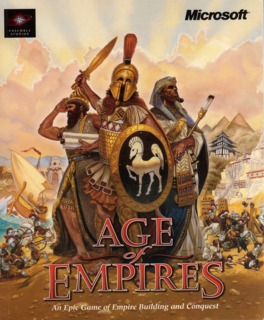Microsoft's first foray into the RTS genre is a noble effort. There are no Trojans hiding in this package.
Let me first start out with a most unobjective view: I love this series. I just love it. AoE is the very reason why I am a PC gamer today. This single game did double duty on me. First, it turned me on to PC gaming. And second, it made me cognizant of the RTS genre which, at this point in time, was really just being born. THIS was the game I remember I wanted. History being one of my favorite subjects this game was a perfect match. I remember reading the articles in magazines and looking at the (back then) incredible screenshots of this game. Holy crap. No game had ever made me want it so bad. I remember when I bought it, sitting in the car, turning it over in my hands and looking at the screenshots on the back box cover. Then actually opening it and seeing the enormous tech tree poster that was included. This was a totally new experience for me. Up until then all my gaming consisted of consoles, but this was new. PC gaming. I remember I bought the game not knowing (or even caring) if my 486 Pentium could even RUN it let alone play it smoothly! But I didn't care. This game held some power over me.
The premise was unique: You start out humbly in the Stone Age and must survive all manner of dangers. From the environment to neighboring tribes. You must then build a successful civilization and guide it through the four ages of Stone, Tool, Bronze and Iron. For each age you entered brought on new technologies, buildings and wonders to discover. You could play the game however you liked. Will you be hostile and build up your military, or would you be more laid back and try a economic approach? It was all up to you.
You built your thriving civilization on basic fundamentals such as wood, stone, food and gold. Winning the game could be done through a variety of ways. Through straight up conquest and obliteration of your enemies. Or you could amass great amounts of materials and build a wonder. If your wonder stands for 1,000 years you automatically win. You could also win through economic means and by cultivating a strong economic base. The options were suited to pretty much every type of player.
Speaking of player, multiplayer is where the real action was. It was all right to face off against the PC AI opponents, but nothing can beat a human vs. another human, and AoE shined in spades with its multiplayer aspect. Being able to customize your maps to almost any design you wished, the replay value was enormous. Setting different parameters and restrictions for each match ensured that no two multiplayer matches would ever be the same. Up to eight players could play on-line either on teams or one for all. It was often he who clicked the fastest clicked last as he would probably be the only guy left alive after a heated match. It was definitely not for the weak hearted, as there was a lot of strategizing and thinking on your feet that would determine the winner. Being able to react at a moments notice and knowing exactly what to do if a situation turned for the worse. These were moments that defined RTS multiplayer and are the reason it is so popular today.
With each new age brought new military units as well. Upgrade your club toting barbarian to a semi-civilized sword carrying militia. All the units of the different civilizations were balanced out well. Taking a rock-paper-scissors approach, virtually every strong unit had a weakness against another, and that unit a weakness towards another and so on. If you find yourself getting charged by cavalry train some phalanx to take them out. Likewise if you're repeatedly dying from volleys of arrow fire train up some cavalry to charge their ranks. You should experiment with the different units, and don't get trapped into using just one since a successful army contains a balance of every type of troop.
The ancient world comes mildly to life with the sound effects. The music in AoE is nothing special, and the various sound effects you'll hear - a villager answering your beck and call to a soldier's last death throes - are serviceable. As far as graphics they were pretty impressive for their time. The 2D sprites move fluidly and all the animations of the different units in different situations are smooth.
Overall AoE has earned its place in gaming history. It was and still is fun to play for those craving a bit of nostalgia to all the flashy 3D games out there today. A classic in its own right, AoE set its own precedents back then, maybe subsconciously, but they were set. After that the RTS flood gates were opened onto a new world in which to perpetuate themselves and become one of the most highly rated and most played genres on the PC till this day. I highly recommend this to someone just getting into the genre and who wouldn't mind playing an older game, or for those curious and want to see where the roots of RTS gaming lie. Also, for those on a not so powerful PC but don't want to be left out of the fun, even the weakest PC of today could run this game now with flying colors.

